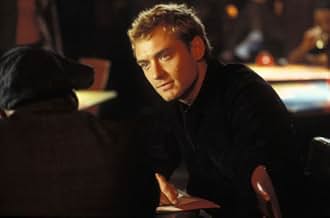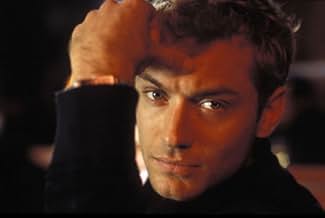IMDb-BEWERTUNG
6,2/10
56.002
IHRE BEWERTUNG
Ein Cockney-Schürzenjäger lernt auf die harte Tour die Gefahren seines Handelns kennen.Ein Cockney-Schürzenjäger lernt auf die harte Tour die Gefahren seines Handelns kennen.Ein Cockney-Schürzenjäger lernt auf die harte Tour die Gefahren seines Handelns kennen.
- Auszeichnungen
- 7 Gewinne & 8 Nominierungen insgesamt
Renée Taylor
- Lu Schnitman
- (as Renee Taylor)
Empfohlene Bewertungen
Why turn "Alfie" into a chick flick?
Maybe for those who mis-remembered the bright, scabrous, creative original. I'm finding that most reviewers are remembering it incorrectly, whereas I saw it for the first time the weekend before I saw this too-pretty make-over.
Most reviewers remember it as black-and-white, which it wasn't.
Most remember it as reflective of the Swinging '60's of London, but the mise en scene was London at the cusp, as attitudes were just starting to change, so characters were flopping in moral confusion.
Most remember the women as pre-liberation, but their passivity was more complicated; Alfie had an unerring ability to hone in on women with horrificallly low self-esteem, regardless of their marital or economic status.
Michael Caine is such an established actor now, none remember that he was not a conventionally handsome lead to be conquering all these women, let alone that he was a cocky Cockney like the Angry Young Man of the period kitchen sink British dramas.
Few remember just how heartless he was - calling all his conquests "it".
None seem to remember how vividly babies and abortion figure into the plot, a la "Vera Drake."
The new version is confused about all these elements.
The cinematography is beautiful, but has to cover up for the fact that while it supposedly takes place in New York City, it was actually filmed in Manchester, England so is missing atmosphere that's so critical to the same ground that's trod in "Sex and the City;" frequent background mattes of the Brooklyn Bridge are weak atmosphere-builders . And this is also some sort of retro NYC that allows smoking in bars and doesn't require helmets on mopeds, which is also a retro means of individual transport.
The film probably takes place in the '00's - but the flashy split screens and the women's make-up and styles are retro-'60's. "Keen Eddie"'s Sienna Miller is made up as a duplicate of the original's Jane Asher. Marisa Tomei even has her hair in a flip with a wide head band and Nia Long is made up like "Cleopatra Jones" from the early '70's.
At least one time we do get a glimpse of a condom package, but that's only obvious now because films today show them, not that they weren't used in the '60's; it does take place in post Roe v. Wade NYC.
The women's personality upgrades are inconsistently effective and there's no drama to how the incredibly beautiful, posh-sounding Jude Law captures them.
Susan Sarandon's self-assured, independent entrepreneur is a sexy, believable update of Shelley Winters' rich widow, making her closing dig at Alfie as a gigolo even more devastating.
Miller's character is now trendily manic depressive, or some such chemically-dependent disorder, rather than just an insecure runaway, which weakens Alfie's hold on her; that character's passive aggressive manipulation of him and how she bypasses him to straighten out her life are missing completely, so we lose some insight into both his cruelty and comeuppance.
Long's character's crisis is weakened from the original's, as her pregnancy conflates two different affairs, with the emphasis instead put on male friendship betrayal, the friend that this "Alfie" claims in passing calls his women "it".
"Alfie"'s health scare had to be updated from TB, and the cancer testing is done for laughs; the lack of mention of Viagra is odd if it is in fact taking place now. Here the older male confidante is stuck in deus ex machina, rather than in plot context.
While the original stands up 35 years later as a mordant and brilliant, matter of fact presentation of "moral lapses," the mild update is considerably weakened and Hollywoodized as respectable company, such that the finale doesn't even segue smoothly into the first musical line of "What's it all about?"
The soundtrack selections are otherwise excellent, but as confusingly retro as the rest of the atmosphere, with neo-soul teen Joss Stone singing and Mick Jagger collaborating with Dave Stewart on originals that sound old.
Maybe for those who mis-remembered the bright, scabrous, creative original. I'm finding that most reviewers are remembering it incorrectly, whereas I saw it for the first time the weekend before I saw this too-pretty make-over.
Most reviewers remember it as black-and-white, which it wasn't.
Most remember it as reflective of the Swinging '60's of London, but the mise en scene was London at the cusp, as attitudes were just starting to change, so characters were flopping in moral confusion.
Most remember the women as pre-liberation, but their passivity was more complicated; Alfie had an unerring ability to hone in on women with horrificallly low self-esteem, regardless of their marital or economic status.
Michael Caine is such an established actor now, none remember that he was not a conventionally handsome lead to be conquering all these women, let alone that he was a cocky Cockney like the Angry Young Man of the period kitchen sink British dramas.
Few remember just how heartless he was - calling all his conquests "it".
None seem to remember how vividly babies and abortion figure into the plot, a la "Vera Drake."
The new version is confused about all these elements.
The cinematography is beautiful, but has to cover up for the fact that while it supposedly takes place in New York City, it was actually filmed in Manchester, England so is missing atmosphere that's so critical to the same ground that's trod in "Sex and the City;" frequent background mattes of the Brooklyn Bridge are weak atmosphere-builders . And this is also some sort of retro NYC that allows smoking in bars and doesn't require helmets on mopeds, which is also a retro means of individual transport.
The film probably takes place in the '00's - but the flashy split screens and the women's make-up and styles are retro-'60's. "Keen Eddie"'s Sienna Miller is made up as a duplicate of the original's Jane Asher. Marisa Tomei even has her hair in a flip with a wide head band and Nia Long is made up like "Cleopatra Jones" from the early '70's.
At least one time we do get a glimpse of a condom package, but that's only obvious now because films today show them, not that they weren't used in the '60's; it does take place in post Roe v. Wade NYC.
The women's personality upgrades are inconsistently effective and there's no drama to how the incredibly beautiful, posh-sounding Jude Law captures them.
Susan Sarandon's self-assured, independent entrepreneur is a sexy, believable update of Shelley Winters' rich widow, making her closing dig at Alfie as a gigolo even more devastating.
Miller's character is now trendily manic depressive, or some such chemically-dependent disorder, rather than just an insecure runaway, which weakens Alfie's hold on her; that character's passive aggressive manipulation of him and how she bypasses him to straighten out her life are missing completely, so we lose some insight into both his cruelty and comeuppance.
Long's character's crisis is weakened from the original's, as her pregnancy conflates two different affairs, with the emphasis instead put on male friendship betrayal, the friend that this "Alfie" claims in passing calls his women "it".
"Alfie"'s health scare had to be updated from TB, and the cancer testing is done for laughs; the lack of mention of Viagra is odd if it is in fact taking place now. Here the older male confidante is stuck in deus ex machina, rather than in plot context.
While the original stands up 35 years later as a mordant and brilliant, matter of fact presentation of "moral lapses," the mild update is considerably weakened and Hollywoodized as respectable company, such that the finale doesn't even segue smoothly into the first musical line of "What's it all about?"
The soundtrack selections are otherwise excellent, but as confusingly retro as the rest of the atmosphere, with neo-soul teen Joss Stone singing and Mick Jagger collaborating with Dave Stewart on originals that sound old.
The tagline for the new film 'Alfie' ask us, what's it all about? The answer, unfortunately, is that it's about sheer disappointment.
The film focuses solely on Alfie Elkins, a swinging young womanizer packed with style and a charm that could only be British. After an all too brief introduction to our protagonist and his long list of lady-friends, some kind of plot begins to develop sort of. We move through far too many completely unrelated situations, all of which only have any relevance at all because of their connection to our main character.
The film does almost nothing to stay focused on a character or situation long enough to develop anything genuine; one minute we have the beginnings of a story with one girl, the next minute we're on to something completely different. You may hope that the film returns to these unfinished story arcs, but it rarely does. And those special times when the story comes back to something that was left unfinished, the film manages to once again leave the story too quickly, adding further loose ends and unresolved issues.
This episodic structure does give the film a pace that is representational of Alfie's dating life constantly moving from one thing to another, never letting anything unfold but this does not work to the advantage of the film. Rather than giving it an interesting structure that parallels the story, it creates confusion and disorientation, and even worse than that a loss of the empathy for the characters that would be present if the film took the time to develop characters and stories properly.
In fact, just about everything in the film lacks conviction, particularly in the places where it is needed the most; moments that should provoke emotion tend to leave the audience wanting something more substantial, which once again is an issue with the film's poor use of development.
If it weren't for Jude Law's charming performance as Alfie Elkins, the film would collapse entirely under its own poor craft. Of course, this is not at all to say that Law saves the film; he does nothing of the sort. His performance, strong as always, just happens to stop the film from being a complete waste of time. His energy is strong and his talent is clear, but it is not enough to bring the film to that next level of quality.
The photography and cinematography, while positively beautiful at times, is staggeringly inconsistent and often not at all fitting to the film's needs. Portions of the film are very nicely photographed, which almost seems like a waste of talent. A spiffy paint job on a car may be appealing to the eye, but why even bother if the car doesn't have an engine? This is precisely what Alfie is all about: some nice looks and a fairly strong performance, but sadly there is no engine to be found.
The film focuses solely on Alfie Elkins, a swinging young womanizer packed with style and a charm that could only be British. After an all too brief introduction to our protagonist and his long list of lady-friends, some kind of plot begins to develop sort of. We move through far too many completely unrelated situations, all of which only have any relevance at all because of their connection to our main character.
The film does almost nothing to stay focused on a character or situation long enough to develop anything genuine; one minute we have the beginnings of a story with one girl, the next minute we're on to something completely different. You may hope that the film returns to these unfinished story arcs, but it rarely does. And those special times when the story comes back to something that was left unfinished, the film manages to once again leave the story too quickly, adding further loose ends and unresolved issues.
This episodic structure does give the film a pace that is representational of Alfie's dating life constantly moving from one thing to another, never letting anything unfold but this does not work to the advantage of the film. Rather than giving it an interesting structure that parallels the story, it creates confusion and disorientation, and even worse than that a loss of the empathy for the characters that would be present if the film took the time to develop characters and stories properly.
In fact, just about everything in the film lacks conviction, particularly in the places where it is needed the most; moments that should provoke emotion tend to leave the audience wanting something more substantial, which once again is an issue with the film's poor use of development.
If it weren't for Jude Law's charming performance as Alfie Elkins, the film would collapse entirely under its own poor craft. Of course, this is not at all to say that Law saves the film; he does nothing of the sort. His performance, strong as always, just happens to stop the film from being a complete waste of time. His energy is strong and his talent is clear, but it is not enough to bring the film to that next level of quality.
The photography and cinematography, while positively beautiful at times, is staggeringly inconsistent and often not at all fitting to the film's needs. Portions of the film are very nicely photographed, which almost seems like a waste of talent. A spiffy paint job on a car may be appealing to the eye, but why even bother if the car doesn't have an engine? This is precisely what Alfie is all about: some nice looks and a fairly strong performance, but sadly there is no engine to be found.
The original 'Alfie,' released in 1966, was considered a revelation for its frank and somewhat dark portrait of the life of a cockney rake, and can now be seen as somewhat prophetic, as it predated (and in some ways helped to introduce) the era of 'swinging London' and the sexual revolution. The 2004 'Alfie' seems to exist for no other purpose than to dress Jude Law up in a hip wardrobe and allow him to wink, smirk, and sigh endlessly at the camera as he sleeps his way through a series of likable women he doesn't deserve. There isn't much of a narrative structure here, and while Law is an engaging screen presence, Alfie is a totally unsympathetic lout who deserves his eventual comeuppance.
It's too bad that Bill Naughton wasn't able to update his original story more effectively, because the film is gorgeous to look at. Despite a few unnecessary bits of cleverness (billboards with odd, art-nouveau messages like 'desire' and 'wish', a lot of mod-ish split screen sequences with still photography, etc.), the cinematography is superb, Law looks dashing in his GQ hipster wardrobe, and the ladies--Susan Sarandon, Jane Krakowski, Nia Long, Marisa Tomei, and newcomer Sienna Miller (whom Law apparently dumped his wife for during filming)--are ravishing. The soundtrack is also superb, made up mostly of new tunes by Mick Jagger and Dave Stewart (of Eurythmics fame).
The biggest problem here is that times have changed since the original Alfie: sexual and gender politics don't allow for a protagonist who bed-hops and deceives women with impunity to be cast as heroic or even remotely sympathetic. In the end, the film seems hollow, like a nearly two-hour long visual fashion spread (interestingly, 'Vanity Fair' editor Graydon Carter has a cameo in the film). Beautiful to look at, but ultimately it's just pretty trash.
It's too bad that Bill Naughton wasn't able to update his original story more effectively, because the film is gorgeous to look at. Despite a few unnecessary bits of cleverness (billboards with odd, art-nouveau messages like 'desire' and 'wish', a lot of mod-ish split screen sequences with still photography, etc.), the cinematography is superb, Law looks dashing in his GQ hipster wardrobe, and the ladies--Susan Sarandon, Jane Krakowski, Nia Long, Marisa Tomei, and newcomer Sienna Miller (whom Law apparently dumped his wife for during filming)--are ravishing. The soundtrack is also superb, made up mostly of new tunes by Mick Jagger and Dave Stewart (of Eurythmics fame).
The biggest problem here is that times have changed since the original Alfie: sexual and gender politics don't allow for a protagonist who bed-hops and deceives women with impunity to be cast as heroic or even remotely sympathetic. In the end, the film seems hollow, like a nearly two-hour long visual fashion spread (interestingly, 'Vanity Fair' editor Graydon Carter has a cameo in the film). Beautiful to look at, but ultimately it's just pretty trash.
Jude Law takes the title role in this remake of the 1966 flick that was the follow-up hit that confirmed Michael Caine as a star. He's been an enduring one, still turning them out, as British actors do, whenever he's asked. 130 movies, with three n various stages of production. Good on him.
But we're talking about the 2004 production, and Jude Law here. Remakes of classics always start with a disadvantage. Just as Caine undoubtedly had to contend with comparisons to Terence Stamp's performance in the original stage production (Stamp turned down the movie, and helped talk Caine into it, impelled, no doubt, by a hope that a good paycheck would get Caine out of his apartment and into his own flat). So lets get to it: Law plays a playboy, not uncaring, but happy with his life of plenty of women and no attachments, who comes to realize that's not what he wants. Caine played the same facade and base.... and then layered them with the coldness he plays so well. Law thinks he has it all; Caine brought an amount of misogynistic disdain into the mix. That might not play in the 21st century, but it's a more nuanced and interesting performance, watching Alfie's change from a cheap villain into his own victim.
Still, this is a handsome production, reset in New York City for no particular reason, and offering a good time. It's not a classic, but it is a good film.
But we're talking about the 2004 production, and Jude Law here. Remakes of classics always start with a disadvantage. Just as Caine undoubtedly had to contend with comparisons to Terence Stamp's performance in the original stage production (Stamp turned down the movie, and helped talk Caine into it, impelled, no doubt, by a hope that a good paycheck would get Caine out of his apartment and into his own flat). So lets get to it: Law plays a playboy, not uncaring, but happy with his life of plenty of women and no attachments, who comes to realize that's not what he wants. Caine played the same facade and base.... and then layered them with the coldness he plays so well. Law thinks he has it all; Caine brought an amount of misogynistic disdain into the mix. That might not play in the 21st century, but it's a more nuanced and interesting performance, watching Alfie's change from a cheap villain into his own victim.
Still, this is a handsome production, reset in New York City for no particular reason, and offering a good time. It's not a classic, but it is a good film.
What's it all about? (opening line from the original-movie 1966)
"Alfie" is a remake of the 1966 British film that made an international star of Michael Caine. It takes a story very much associated with a particular time and place -- London in the swinging '60s -- and successfully transplants it to modern-day New York City. The cockney lothario played by Caine has been turned into a working-class British émigré played by Jude Law, who makes Alfie a bit less cockney and a bit more self-aware.
Alfie's a smooth talking Londoner in New York who does his very best to avoid succumbing to the dreaded 'c' word commitment. Along the way, we're introduced to some of his ladies on the go Dorie, Julie, Liz and Nikki, to name but a few.
Like the earlier "Alfie," it's the story of a sexually promiscuous man. Alfie (Law), a chauffeur, lives in a small Manhattan apartment and dedicates his life to seducing women. Talking directly into the camera, and preening with a self-satisfaction so complete as to seem a form of innocence, he expounds on clothes, the proper application of cologne and the various rules he employs in his libidinous pursuits. His goal, it seems, is to have sex with as many women as possible but to get close to none of them.
Each one starts off as a fling, but somehow manages to influence Alfie's life. He slowly starts to realize that he is actually alone and that there is more to life than what he has done so far.
Like the earlier "Alfie," the new version could be called a cautionary tale, about a way of life that leads to the existential confusion embodied in the famous catchphrase, "What's it all about?"
Anyone we know in it? Jude Law is fresh and funny as Alfie, with just the right amount of smug attitude. The stunning Sienna Miller is the beautiful but 'damaged' Nikki, and Susan Sarandon sizzles as the sexy older woman, Liz. There's also Marisa Tomei (Julie), Nia Long (Lonette) and Omar Epps plays Alfie's best friend, Marlon.
Would I recommend it? Definitely. Although remakes do not usually come through smelling of roses, this one does. It's fresh, colourful and funny. Jude Law is magnificent, introducing us to a slightly warmer side of Alfie than Michael Caine.
"Alfie" is a remake of the 1966 British film that made an international star of Michael Caine. It takes a story very much associated with a particular time and place -- London in the swinging '60s -- and successfully transplants it to modern-day New York City. The cockney lothario played by Caine has been turned into a working-class British émigré played by Jude Law, who makes Alfie a bit less cockney and a bit more self-aware.
Alfie's a smooth talking Londoner in New York who does his very best to avoid succumbing to the dreaded 'c' word commitment. Along the way, we're introduced to some of his ladies on the go Dorie, Julie, Liz and Nikki, to name but a few.
Like the earlier "Alfie," it's the story of a sexually promiscuous man. Alfie (Law), a chauffeur, lives in a small Manhattan apartment and dedicates his life to seducing women. Talking directly into the camera, and preening with a self-satisfaction so complete as to seem a form of innocence, he expounds on clothes, the proper application of cologne and the various rules he employs in his libidinous pursuits. His goal, it seems, is to have sex with as many women as possible but to get close to none of them.
Each one starts off as a fling, but somehow manages to influence Alfie's life. He slowly starts to realize that he is actually alone and that there is more to life than what he has done so far.
Like the earlier "Alfie," the new version could be called a cautionary tale, about a way of life that leads to the existential confusion embodied in the famous catchphrase, "What's it all about?"
Anyone we know in it? Jude Law is fresh and funny as Alfie, with just the right amount of smug attitude. The stunning Sienna Miller is the beautiful but 'damaged' Nikki, and Susan Sarandon sizzles as the sexy older woman, Liz. There's also Marisa Tomei (Julie), Nia Long (Lonette) and Omar Epps plays Alfie's best friend, Marlon.
Would I recommend it? Definitely. Although remakes do not usually come through smelling of roses, this one does. It's fresh, colourful and funny. Jude Law is magnificent, introducing us to a slightly warmer side of Alfie than Michael Caine.
Wusstest du schon
- WissenswertesSusan Sarandon gave pictures of herself in the 1970s to British artist Russell Oxley, who used them to paint an acrylic portrait of her character, supposedly from that era. After filming, the canvas went home with Sarandon.
- PatzerRight after the flower shop scene, Alfie rides his scooter to Liz's place. Only the flowers are not in the basket or anywhere on the scooter. Yet as he comes around the corner of the stairs towards the apartment, he has the flowers in his hand.
- Zitate
[last lines]
Alfie: What have I got? Really? Some money in my pocket. Some nice threads, fancy car at my disposal, and I'm single. Yeah... unattached, free as a bird... I don't depend on nobody. Nobody depends on me. My life's my own. But I don't have peace of mind. And if you don't have that, you've got nothing. So... So what's the answer? That's what I keep asking myself. What's it all about? You know what I mean?
- Crazy CreditsThe producers wish to thank residents and businesses of Northern Quarter Manchester
- SoundtracksAlfie
Written by Burt Bacharach & Hal David
Performed by Joss Stone
Produced by David A. Stewart (as Dave Stewart) & Mick Jagger
Joss Stone performs courtesy of S-Curve Records/EMI Music North America
Top-Auswahl
Melde dich zum Bewerten an und greife auf die Watchlist für personalisierte Empfehlungen zu.
- How long is Alfie?Powered by Alexa
Details
- Erscheinungsdatum
- Herkunftsländer
- Sprache
- Auch bekannt als
- Untitled Alfie Remake
- Drehorte
- Produktionsfirmen
- Weitere beteiligte Unternehmen bei IMDbPro anzeigen
Box Office
- Budget
- 60.000.000 $ (geschätzt)
- Bruttoertrag in den USA und Kanada
- 13.399.812 $
- Eröffnungswochenende in den USA und in Kanada
- 6.218.335 $
- 7. Nov. 2004
- Weltweiter Bruttoertrag
- 35.060.882 $
Zu dieser Seite beitragen
Bearbeitung vorschlagen oder fehlenden Inhalt hinzufügen





































